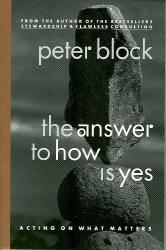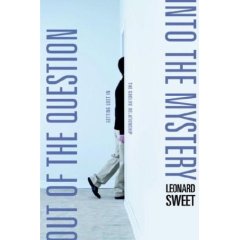
Sam Davidson blogs about the book The Answer to How is Yes. Sam writes, it
was nothing like I imagined. I thought that if the answer to How? was yes, then I didn’t understand the question. Or that questions were stupid and actions were all that mattered. As an action-oriented guy, I thought I would resonate with him saying that we should stop asking questions and start changing the world.Block writes, “Choosing to act [now] on ‘what matters’ is the choice to live a passionate existence, which is anything but controlled and predictable.”
But that’s not his approach. Block articulates that when seeking to change or start something, the how questions are constraining. By asking them, we’ve already cemented our approach. For example, when asking, “How much will it cost?” we already assume that money is needed for something.
But, instead of simple deconstruction, Block builds and offers new questions:By switching the questions, we move from a life and work centered on bottom lines and benchmarks to a life of meaning and fulfillment.
- Instead of asking, “How do you do it?” you ask, “What refusal have I been postponing?”
- Instead of asking, “How long will it take?” you ask, “What commitment am I willing to make?”
- Instead of asking, “How much does it cost?” you ask, “What is the price I am willing to pay?”
- Instead of asking, “How do you get those people to change?” you ask, “What is my contribution to the problem I am concerned with?”
- Instead of asking, “How do we measure it?” you ask, “What is the crossroad at which I find myself at this point in my life/work?”
- Instead of asking, “How have other people done it successfully?” you ask, “What do we want to create together?”
I picked up a copy at the Waterloo Public Library last week. It's well worth reading. While Bock is not writing for the church, there are things here that are helpful in terms of how we decide and make choices. As you can tell by the questions Bock asks above, he invites us to reflect on the important question, or as the subtitle says "acting on what matters".
I also found it helpful, because I tend to reflect more philosophically on questions than move things forward into action. This book is a helpful reminder that we [I] need to not only be focused on "being", but also help us move into "doing", in a healthy sense.
Here's another quote that is right on the money:
Also, remember that the question of "How do you do it?" is more often an indirect expression of our doubts than real curiosity. So let the doubts be stated directly and let them be owned by the doubter as an internal struggle in their thinking rather than detached observation of the external world.I think we see this in the proliferation of "programs in a box" that are readily available in the Christian / church world. In recent years we have seen The Prayer of Jabez and Purpose-Driven Church /Life materials be best sellers and additional materials being connected with it as well. We've also seen the overload of "Christian" marketing around The Passion and The Chronicles of Narnia.
Some of these resources are good - there is no doubt about that. But there is also a sense that churches have been very quick to jump on the "bandwagon" and copy a program rather than do the hard work of wrestling through "What is God doing in this place?" We would rather spend money on a package which will help us be successful, than spend time in praying together that will lead to obedience.
One last quote from the book... in fact the closing words of the book.
Problems that count need to be respected before they will reveal themselves to us. The focus on tools, answers, and problem solving keeps them in hiding, because we will just revert to the solutions, which are more easily implimented. The push for concrete action is exactly what sidetracks our dreams and postpones until tomorrow what needs to be addressed today. In the movie Shakespeare in Love, one of the characters is constantly in trouble, and when pressed to the wall on when he is going to repay his debt, he answers "It's a mystery to me." It could be seen as a clever way of stalling, but perhaps it was a genuine expression of faith.

One last thought: Len Sweet picks up some of this in his book Out of the Question... Into the Mystery: Getting Lost in the Godlife Relationship
Peter Bock's site is designed learning.
No comments:
Post a Comment